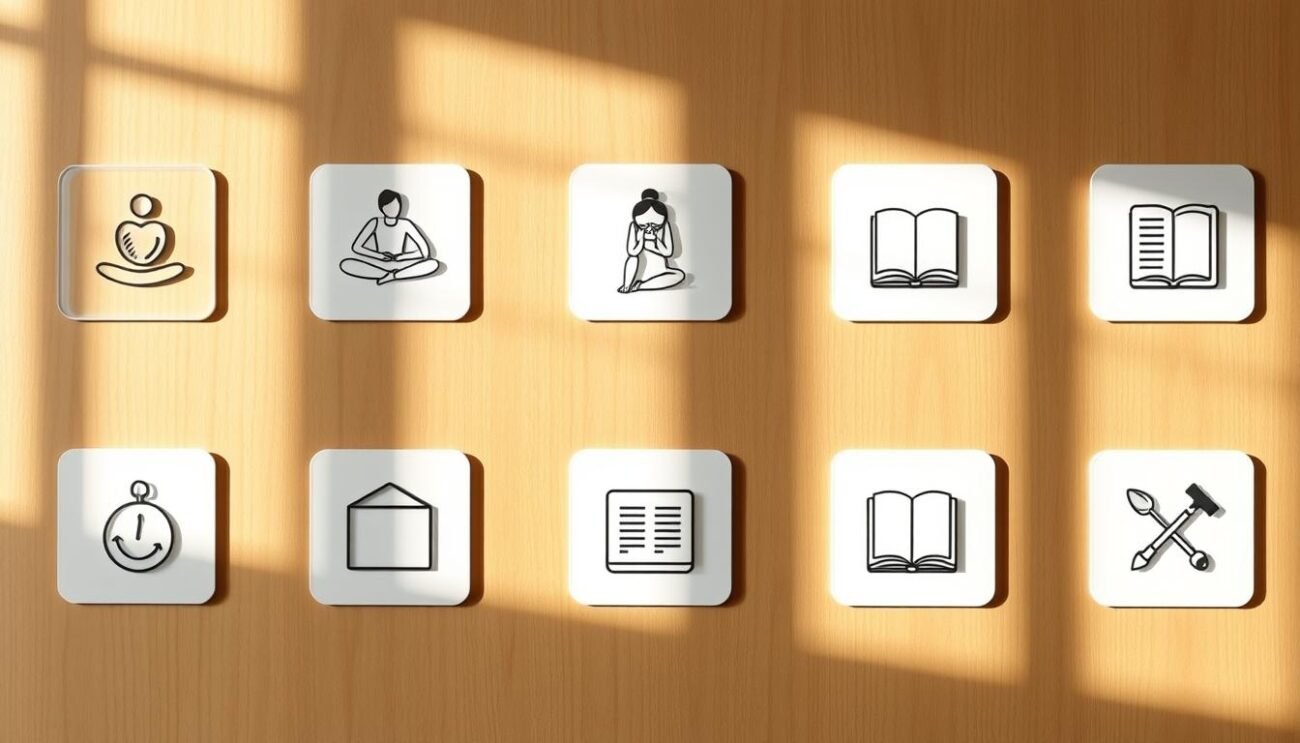Did you know that small, consistent changes in your daily habits can lead to significant improvements in your overall well-being? Adopting the right habits can be a game-changer for personal growth, enhancing both self-improvement and productivity. By incorporating powerful habits into your daily routine, you can transform your life in profound ways.
Focusing on personal growth through habits such as goal setting, mindfulness, and continuous learning can have a lasting impact. It’s about making intentional choices that foster a more productive and fulfilling life. By understanding and implementing these habits, individuals can experience significant positive changes.
Key Takeaways
- Identify and adopt habits that promote personal growth.
- Understand the importance of self-improvement in daily life.
- Learn how to boost productivity through simple habit changes.
- Discover the role of mindfulness in transforming your life.
- Implement a system for continuous learning and improvement.
The Power of Daily Habits in Personal Transformation
Daily habits are the building blocks of our lives, shaping who we are and who we become. The small, consistent actions we take every day have a profound impact on our personal growth and transformation. By understanding and harnessing the power of these habits, we can take control of our lives and steer ourselves towards our desired outcomes.
Practicing mindfulness is one such habit that can be a sanctuary. Incorporating mindfulness into our daily routine can significantly enhance our well-being and mental clarity. It’s about creating a space for ourselves to breathe, reflect, and recharge.
How Habits Shape Your Identity
Our habits reflect our values and priorities. They are a manifestation of our character and play a crucial role in shaping our identity. By adopting positive habits, we can cultivate a stronger, more resilient version of ourselves. For instance, habits like regular exercise, reading, or journaling can contribute to personal growth and self-improvement.
Moreover, the cumulative effect of our daily habits can lead to significant changes over time. It’s the small, consistent efforts that often yield the most substantial results. By focusing on developing good habits, we can create a positive feedback loop that reinforces our personal growth.
The Science Behind Habit Formation
The process of habit formation is rooted in psychology. It involves a cue that triggers a behavior, followed by a reward that reinforces the behavior. Understanding this mechanism can help us in creating and maintaining new habits. For example, setting clear goals and tracking progress can serve as a cue and reward, respectively, in forming new habits.
By being aware of the science behind habit formation, we can strategically develop habits that support our personal growth and well-being. This knowledge empowers us to make intentional choices about the habits we want to cultivate, leading to a more fulfilling life.
Why Self-Improvement & Productivity Habits Matter
Embracing habits that promote self-improvement and productivity can transform your life in profound ways. By incorporating small, consistent actions into your daily routine, you can achieve significant improvements in your overall well-being and success.

The Compound Effect of Small Daily Actions
Small habits can create big changes when it comes to your overall health and happiness. Creating routines that nurture your mind, body, and spirit will begin to make you feel more grounded, centered, and fulfilled. For instance, dedicating just 10 minutes a day to a new habit can have a compound effect over time, leading to substantial progress in your personal and professional life.
The key is consistency and patience. As you continue to practice these habits, you’ll start to notice improvements in your productivity and overall sense of well-being. This is because small daily actions can add up, much like how small deposits into a savings account can grow over time.
Breaking the Cycle of Procrastination
Procrastination is a common barrier to adopting new habits. However, by understanding the reasons behind your procrastination, you can develop strategies to overcome it. One effective method is to break down large tasks into smaller, manageable chunks, making it easier to stay focused and motivated.
Additionally, implementing a time management system can help you prioritize tasks and avoid procrastination. By setting clear goals and deadlines, you can create a schedule that works for you, not against you. This will enable you to make steady progress towards your objectives, enhancing your productivity and reducing stress.
By adopting self-improvement and productivity habits, you can take control of your life and achieve your goals. Remember, the journey to a more fulfilling life is ongoing, and every small step counts.
Habit #1: Morning Mindfulness Practice
A morning mindfulness practice is a simple yet powerful habit that can transform your daily life. By dedicating a few minutes each morning to mindfulness, you can enhance your mental clarity, reduce stress, and set a positive tone for the day.
Benefits of Starting Your Day Mindfully
Starting your day with mindfulness can have a profound impact on both mental and physical well-being. Mindfulness practice has been shown to reduce stress and anxiety, improve focus, and boost mood. By being present in the moment, you can better navigate the challenges that lie ahead.
As Jon Kabat-Zinn, a renowned mindfulness expert, once said, “Mindfulness is the aware, balanced acceptance of the present moment.” This acceptance can lead to a more harmonious and productive day.
“The present moment is the only moment available to us, and it is the door to all moments.”
Simple 5-Minute Morning Mindfulness Routines
Incorporating mindfulness into your morning routine can be as simple as taking a few minutes to focus on your breath. Here are some easy-to-follow routines:
- Focus on your breath for 5 minutes, observing its pattern without attempting to control it.
- Practice a body scan, bringing awareness to each part of your body from toes to head.
- Engage in a mindful walking meditation, paying attention to the sensation of each step.
These simple practices can help you cultivate a sense of calm and clarity, preparing you for the day ahead.
By incorporating a morning mindfulness practice into your daily routine, you can experience the benefits of reduced stress, improved focus, and a more positive outlook on life. As you start your journey with mindfulness, remember that consistency is key. Even a few minutes each day can make a significant difference over time.
Habit #2: Strategic Goal Setting and Review
Strategic goal setting is a powerful habit that can revolutionize your life by providing direction and focus. By setting clear, achievable goals, you can align your daily actions with your long-term aspirations, leading to significant personal and professional growth.

Setting SMART Goals That Actually Work
To make the most of goal setting, it’s essential to create SMART goals – Specific, Measurable, Achievable, Relevant, and Time-bound. This framework helps ensure that your goals are clear, actionable, and aligned with your values.
- Specific: Clearly define what you want to achieve.
- Measurable: Quantify your goal so progress can be tracked.
- Achievable: Ensure the goal is realistic based on your resources and constraints.
- Relevant: Align your goal with your broader life objectives.
- Time-bound: Set a specific deadline for achieving your goal.
For instance, instead of saying “I want to be healthier,” a SMART goal would be “I will reduce my body fat percentage from 25% to 20% within the next 6 months by exercising for 30 minutes, 3 times a week.”
The Weekly Review System
Setting goals is just the first step; regularly reviewing and adjusting them is crucial for success. The Weekly Review System involves dedicating time each week to assess your progress, celebrate your achievements, and make necessary adjustments to your goals and strategies.
During your weekly review, consider the following:
- Reflect on your accomplishments and challenges.
- Assess whether you’re on track to meet your goals.
- Identify any obstacles and brainstorm solutions.
- Adjust your plans as needed to stay aligned with your goals.
By incorporating strategic goal setting and regular review into your routine, you’ll be better equipped to achieve your objectives and make meaningful progress in your personal and professional life.
Habit #3: Prioritized Time Blocking
Prioritized time blocking is a powerful habit that can significantly enhance your productivity and help you achieve your goals. By allocating specific time slots to tasks based on their priority, you can ensure that you’re making the most of your time.
The Matrix Method for Task Prioritization
The Matrix Method is a decision-making tool that helps you prioritize tasks based on their urgency and importance. To apply this method, categorize your tasks into four quadrants:
- Urgent and Important: Tasks that are both urgent and important should be your top priority.
- Not Urgent but Important: Tasks that are important but not urgent should be scheduled and planned for.
- Urgent but Not Important: Tasks that are urgent but not important can be delegated if possible.
- Not Urgent and Not Important: Tasks that are neither urgent nor important can be eliminated or minimized.
Implementing Effective Time Blocks
To implement effective time blocking, start by listing all the tasks you need to accomplish. Then, allocate specific time slots for each task based on its priority. Here are some tips to make the most of time blocking:
- Be Realistic: Be realistic about how much time each task will take.
- Avoid Multitasking: Focus on one task per time block to ensure you’re giving it your undivided attention.
- Leave Buffer Time: Leave some buffer time between tasks to account for unexpected interruptions.
- Review and Adjust: Regularly review your time blocks and adjust them as needed to ensure they’re still aligned with your priorities.
By incorporating prioritized time blocking into your daily routine, you can significantly boost your productivity and achieve your goals more efficiently.
Habit #4: Deliberate Learning and Skill Development
Deliberate learning is a powerful habit that can transform your life in profound ways. By dedicating time to acquiring new skills and knowledge, you can enhance your personal growth and stay ahead in an ever-changing world.
To start, identify a topic or skill that you’re curious about and set aside some dedicated time each week to delve into this new learning. This could be anything from a new language, a musical instrument, or a professional skill. The key is to be consistent and make learning a habit.
The 20-Minute Daily Learning Habit
One effective way to cultivate deliberate learning is by adopting a daily learning habit. Allocate just 20 minutes each day to focus on learning something new. This could involve reading a chapter from a book, watching a tutorial, or practicing a new skill. The 20-minute daily learning habit is manageable and can lead to significant progress over time.
For instance, if you’re interested in learning a new language, you could use an app like Duolingo to practice for 20 minutes each day. Similarly, if you’re looking to improve your writing skills, you could dedicate 20 minutes to writing and editing.

Creating Your Personal Knowledge Management System
A personal knowledge management system is crucial for organizing the information you gather during your learning journey. This system can be as simple as a note-taking app or as complex as a digital database. The goal is to create a system that works for you and allows you to easily access and review the information you’ve learned.
To create your system, start by choosing a tool that you’re comfortable with. This could be Evernote, Notion, or even a simple spreadsheet. Then, develop a method for categorizing and tagging the information you collect. Regularly reviewing and updating your system will help you retain the knowledge and make connections between different pieces of information.
By incorporating deliberate learning into your daily routine and creating a system to manage your knowledge, you’ll be taking significant steps towards self-development and achieving your personal growth goals.
Habit #5: Physical Exercise and Movement
Regular physical activity is not just about physical health; it’s a crucial element in transforming your life. Beyond improving your physical well-being, working out regularly has been shown to pump up creativity and enhance cognitive skills.
Finding Your Optimal Exercise Routine
Discovering the right exercise routine can be a challenge, but it’s essential for making physical activity a sustainable habit. To find your optimal routine, consider the following factors:
- Personal Preferences: Choose activities you enjoy, whether it’s running, swimming, or dancing.
- Lifestyle: Consider your schedule and select exercises that fit within it.
- Goals: Define what you want to achieve through exercise, whether it’s weight loss, muscle gain, or improved endurance.
| Exercise Type | Benefits | Examples |
|---|---|---|
| Cardio | Improves heart health, boosts mood | Running, cycling, swimming |
| Strength Training | Builds muscle, increases metabolism | Weightlifting, bodyweight exercises |
| Flexibility | Enhances flexibility, reduces injury risk | Yoga, Pilates, stretching |
Incorporating Movement Throughout Your Day
In addition to a dedicated exercise routine, incorporating movement throughout your day can have significant benefits. Simple actions like taking the stairs, walking to work, or doing a few jumping jacks during commercial breaks can add up.
- Take a short walk during your lunch break to refresh your mind and body.
- Use a standing desk or adjustable desk to alternate between sitting and standing.
- Take the stairs instead of the elevator when possible.
By combining a consistent exercise routine with increased daily movement, you can experience the full range of benefits that physical activity has to offer, from improved physical health to enhanced mental clarity and productivity.
Habit #6: Mindful Digital Consumption
Mindful digital consumption is not just about reducing screen time; it’s about creating a more intentional and balanced digital experience. In a world where digital information is constantly at our fingertips, being mindful of how we consume this information is crucial for our mental and emotional well-being.
By being more mindful of our digital habits, we can reduce the feeling of overwhelm and increase our productivity. This involves being aware of the content we consume, the time we spend on digital devices, and how these habits impact our lives.
Digital Detox Strategies That Work
Implementing digital detox strategies can help you regain control over your digital habits. One effective approach is to designate screen-free periods in your daily routine, such as during meals or the last hour before bed.
- Schedule digital-free times of the day
- Use apps that track and limit screen time
- Engage in offline activities like reading or meditation
| Digital Detox Strategy | Benefits |
|---|---|
| Screen-free meals | Improved digestion, increased mindfulness |
| Digital-free hours before bed | Better sleep quality, reduced stress |
| Offline activities | Increased productivity, enhanced creativity |

Curating High-Quality Information Sources
Curating high-quality information sources is another crucial aspect of mindful digital consumption. This involves being selective about the content you consume and ensuring that it adds value to your life.
Follow credible sources that align with your interests and needs. Unsubscribe from newsletters or follow less frequently sources that do not provide significant value.
By adopting these strategies, you can transform your digital consumption habits, leading to a more balanced and fulfilling life.
Habit #7: Intentional Relationship Building
The quality of our relationships often determines the quality of our lives, making intentional relationship building a vital habit. In today’s fast-paced world, it’s easy to let meaningful connections with others fall by the wayside. However, nurturing these relationships is crucial for our emotional well-being and personal growth.
Making an effort to connect with someone in your life every day can have a significant impact. This could be as simple as a phone call to a family member, a coffee catch-up with a friend, or a heartfelt conversation with a loved one. The key is to be intentional about these interactions, ensuring they are meaningful and not just superficial.
The Five-Person Rule for Personal Growth
The Five-Person Rule suggests that the people you surround yourself with can significantly influence your personal growth. These five individuals can be categorized based on their impact on your life:
| Category | Description | Impact on Personal Growth |
|---|---|---|
| The Negative | People who drain your energy and are negative. | Limit exposure to minimize negative impact. |
| The Nurturer | Individuals who support and encourage you. | Invest in these relationships to foster growth. |
| The Mentor | Experienced individuals who guide and advise you. | Seek their counsel to gain valuable insights. |
| The Challenger | People who push you out of your comfort zone. | Engage with them to stimulate personal development. |
| The Visionary | Innovative thinkers who inspire new ideas. | Collaborate with them to explore new possibilities. |
Meaningful Connection Practices
To build intentional relationships, it’s essential to practice meaningful connection practices. Here are a few strategies:
- Active Listening: Give your full attention to the person you’re interacting with, showing genuine interest in their thoughts and feelings.
- Regular Check-ins: Schedule regular meetings or calls with loved ones and friends to maintain and deepen your relationships.
- Empathy and Understanding: Practice empathy by putting yourself in others’ shoes and trying to understand their perspectives.
- Quality Time: Spend quality time with others, engaging in activities that are meaningful to both parties.
By incorporating these practices into your daily life, you can cultivate stronger, more meaningful relationships that contribute to your personal growth and overall happiness.
Habit #8: Reflective Journaling
By incorporating reflective journaling into your daily routine, you can gain valuable insights into your thoughts, emotions, and behaviors. Reflective journaling is more than just writing down your daily experiences; it’s a gateway to self-discovery and personal growth.

Effective Journaling Prompts for Self-Discovery
To get the most out of your journaling practice, it’s helpful to use guided prompts that encourage reflection and introspection. Some effective prompts include:
- What are your goals for the next month, and what steps can you take to achieve them?
- Reflect on a challenging experience you’ve had recently. What did you learn from it, and how has it shaped you?
- What are the things that bring you joy and fulfillment? How can you incorporate more of these into your daily life?
Using these prompts can help you tap into your inner world, fostering a deeper understanding of yourself and your place in the world.
Tracking Progress and Patterns
One of the most powerful aspects of reflective journaling is the ability to track your progress and identify patterns over time. By regularly reviewing your journal entries, you can:
- Observe how your thoughts and feelings evolve
- Identify recurring themes or challenges
- Celebrate your achievements and milestones
This process of tracking and reflection can be incredibly motivating, helping you stay committed to your personal growth journey.
Incorporating reflective journaling into your daily habits can have a profound impact on your life, promoting self-awareness and personal growth. By making journaling a consistent practice, you can cultivate a deeper understanding of yourself and navigate life’s challenges with greater ease and confidence.
Habit #9: Gratitude and Positive Mindset Cultivation
Practicing gratitude is a simple yet powerful habit that can lead to significant improvements in our mental health and overall quality of life. By incorporating gratitude into our daily routine, we can enhance our well-being, foster a positive mindset, and develop resilience against life’s challenges.
The Three Good Things Practice
One effective way to cultivate gratitude is through the “Three Good Things” practice. This involves taking a few minutes each day to write down three things that went well and why they happened. This practice helps shift our focus from negative thoughts to positive experiences, fostering a more optimistic outlook.
To implement this practice, set aside a dedicated time each day, such as before bed, to reflect on your day. Write down three good things that occurred, no matter how small they may seem, and explain why they happened. This could be something as simple as enjoying a good cup of coffee or receiving a kind word from a friend.
Reframing Challenges as Opportunities
Another crucial aspect of cultivating a positive mindset is learning to reframe challenges as opportunities for growth. Instead of viewing obstacles as negative experiences, we can choose to see them as chances to learn and develop new skills.
To reframe challenges effectively, start by acknowledging the difficulty you’re facing. Then, ask yourself what you can learn from the experience and how it can help you grow. This mindset shift can transform potential setbacks into stepping stones for personal development.
By combining the practice of gratitude with the ability to reframe challenges, we can cultivate a robust positive mindset that enhances our overall well-being and helps us navigate life’s ups and downs with greater ease and resilience.
Habit #10: Restorative Sleep Optimization
Improving sleep quality is essential for both physical and mental rejuvenation. Restorative sleep optimization involves creating an environment and establishing routines that foster deep, uninterrupted sleep.

Creating the Perfect Sleep Environment
A conducive sleep environment is crucial for restorative sleep. This involves ensuring the bedroom is dark, quiet, and at a comfortable temperature. Consider using blackout curtains, earplugs, or a white noise machine if necessary. Investing in a comfortable mattress and pillows can also significantly improve sleep quality.
Key elements of a sleep-friendly environment include:
- A dark, quiet room
- A comfortable mattress and pillows
- A cool room temperature
The Ideal Evening Wind-Down Routine
Establishing a consistent evening wind-down routine can signal to the body that it’s time to sleep. This can include activities such as reading, meditation, or a warm bath. Avoid screens and electronic devices at least an hour before bedtime, as the blue light they emit can interfere with the production of melatonin, the sleep hormone.
Try to establish a regular sleep schedule where you go to bed and wake up at the same time every day, including weekends. Consistency can help regulate your body’s internal clock and improve the quality of your sleep.
By implementing these strategies, you can optimize your sleep habits and wake up feeling refreshed and rejuvenated.
Measuring Your Habit Progress
Monitoring your habits is key to understanding your progress and making necessary adjustments. By keeping track of your daily activities, you can identify patterns, stay motivated, and make informed decisions to optimize your routine.
Habit Tracking Tools and Apps
In today’s digital age, numerous tools and apps are available to help you track your habits effectively. These range from simple, intuitive apps like Habitica and HabitBull to more comprehensive platforms like Trello and Notion.
| Tool/App | Features | Platform |
|---|---|---|
| Habitica | Gamifies your to-do list and habits | iOS, Android |
| HabitBull | Offers detailed habit tracking and analytics | iOS, Android |
| Trello | Visualizes tasks and habits using boards | Web, iOS, Android |
| Notion | All-in-one workspace for notes, tasks, and habits | Web, iOS, Android |
When choosing a habit tracking tool, consider what features are most important to you, such as ease of use, customization options, and integration with other apps you use.
Celebrating Milestones and Small Wins
Celebrating your achievements, no matter how small, is crucial for maintaining motivation. Recognizing your progress helps reinforce positive behaviors and encourages you to continue striving towards your goals.
- Set clear milestones: Break down larger goals into smaller, achievable milestones.
- Reward yourself: Choose meaningful rewards to celebrate reaching milestones.
- Reflect on your journey: Regularly review your progress to understand how far you’ve come.
By incorporating these practices into your habit tracking routine, you’ll not only stay motivated but also gain a deeper understanding of your personal growth journey.
Overcoming Habit Implementation Challenges
The journey to transforming your life through habits is not without its challenges. As you strive to implement new habits, you’ll likely encounter resistance and procrastination. However, understanding the strategies to overcome these obstacles can significantly enhance your success rate.

Dealing with Resistance and Procrastination
When faced with resistance or procrastination, it’s essential to revisit your goals and remind yourself why you started. Reflecting on your motivations can help you regain momentum. Additionally, breaking down large tasks into smaller, manageable chunks can make the process less daunting.
Using the 2-minute rule can also be effective. If a task can be done in less than 2 minutes, do it immediately. This helps build momentum and reduces procrastination. Furthermore, creating an environment conducive to productivity, such as turning off notifications or finding a quiet workspace, can significantly impact your ability to stay on track.
The Habit Stacking Method
The habit stacking method involves building new habits onto existing ones. This strategy leverages the stability of established habits to support the development of new ones. For instance, if you already have a habit of brushing your teeth every morning, you can stack a new habit like flossing immediately after.
To implement habit stacking effectively, start by identifying your existing habits. Then, choose a new habit you want to develop and stack it onto an existing habit. Be consistent and patient, as building new habits takes time.
- Identify existing habits that you can stack new habits onto.
- Choose a new habit you want to develop.
- Stack the new habit immediately after an existing one.
- Be consistent and patient.
By understanding and applying these strategies, you can overcome common challenges in habit implementation and continue on your path to personal transformation.
Conclusion: Your Transformed Life Begins Today
Creating life-changing habits is a journey that starts with small, consistent steps toward a healthier, happier, and more fulfilling life. By incorporating the 10 habits outlined in this article, you can experience profound personal growth and improvements in self-improvement & productivity.
Mastering these habits requires patience and consistency. Start with one habit, master it, and then move on to the next. As you progress, you’ll notice significant changes in your daily life, leading to a more balanced and purposeful existence.
Developing positive habits is a powerful tool for transforming your life. By focusing on personal growth and self-improvement & productivity, you can unlock your full potential and achieve your goals. The key is to be consistent and persistent in your efforts, celebrating small wins along the way.
Now is the time to take the first step towards a transformed life. By adopting these habits and making them a part of your daily routine, you’ll be well on your way to achieving your goals and living a more fulfilling life.

